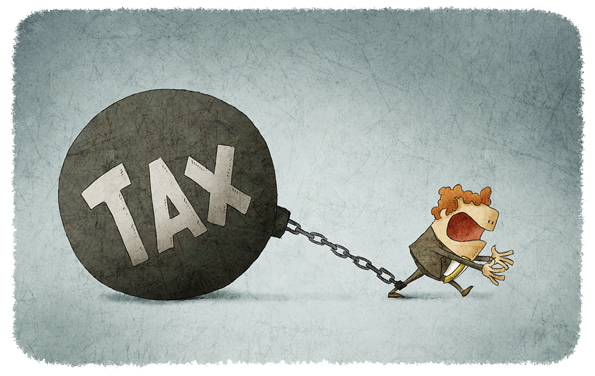Taxes: How Much You Really Pay
We all hate it, but it’s a fact of life, as certain as death, as the old saying goes. There are federal income taxes, state income taxes, sales taxes, city taxes, property taxes, and even death taxes (see [insert Link to Death Tax Blog]). When you combine all the taxes, it may be surprising to learn just how much of your hard-earned income you actually get to keep—and how much is handed over to the Tax Man.
First, the federal government taxes your income, and assuming you are not self-employed, conveniently takes its share right out of your paycheck. It takes anywhere from 10% – 39.6% of your total income, depending on your filing status, number of dependents, and total household income. The average person pays 17% of their gross income to this federal tax.
Next comes the Social Security and Medicare taxes, which are also a payroll deduction if employed. This eats away at your income by another 7.65% for employees, or 15.3% for those who are are self-employed.
Also included as a deduction on your paycheck are state or local personal income taxes, which vary by state. The average person pays 10.1% for state income taxes. These three deductions take 34.75% of the average person’s income if they are employees, or 42.4% for the self-employed. For a person earning 200,000 per year, this means bringing home $130,500 of your hard-earned money, or $115,200 if you are self-employed.
What Percent of Your Income is Going to Taxes
The average American employee pays
Federal Personal Income Tax of 17%
FICA of 7.65%
State Personal Income Tax of 10.1%
TOTAL TAX 34.75%
And just when you thought it was all over, your take home pay is subject to still more taxes. Assuming you are an employee rather than self-employed, you take the $130,500 of your income that actually belongs to you and, let’s say you spend it. Vehicles are taxed. Your meal at Panera is taxed. Yes, even the coffee at Starbucks is taxed. Your home? All are taxed.
Let’s take property taxes first. If you gross $200,000 per year, you can probably afford a home valued at $442,000. In Utah, based on the state median tax rate, you would pay $2,652 in taxes each year on this home. So you can take another 1.3% off your original $200,000, leaving you now with $127,848 to spend.
Then comes the sales tax. The average sales tax rate is 9.7% across all states, but the rate is highly variable depending on where you live. Some states do not levy sales tax at all (Alaska, Delaware, New Hampshire, Montana, and Oregon), while others charge a high rate (Tennessee, Arkansas). Further complicating the figure, some items are taxed at a higher rate. John Mikesell in The Disappearing Retail Sales Tax calculated that as of 2011, approximately 34.46% of a person’s total income will eventually be subject to sales tax. Let’s assume this to be a fair representation. So of your $200,000 earned, $68,920 would be subject to sales tax. That $68,920, on average, would be taxed 9.7%, taking another $6,685 out of your pocket, and into the pocket of the Tax Man.
This leaves you with $121,163. This is only 60.5% of what you earned. So let’s summarize where your $200,000 is really going:
| AverageTax rate | Total Tax | Remaining Income | |
| Federal Personal Income Tax | 17% | $34,000 | $166,000 |
| FICA | 7.65% | $15,300 | $150,700 |
| State & Local Income Taxes | 10.1% | $20,200 | $130,500 |
| Property Tax | 1.3% | $2,652 | $127,848 |
| Sales Tax | 9.75% on 34.46% of gross | $6,685 | $121,163 |
| TOTAL TAXES | $78,837 |
$78,837 taxed of $200,000 = 39.4% effective tax rate
Finally, upon your unfortunate death, there may be even more taxes such as the Death Tax.
Fortunately, there are ways to mitigate your tax burden and keep more of your hard earned dollars. This may include tax credits (hybrid cars, green home improvements), making charitable contributions and other tax-deductible actions, lowering your tax rate by earning income from stocks and real estate, shifting income to those in lower tax brackets (children), and life insurance policies.
Many people believe that they will be in a better position by making tax deferred contributions to Qualified Retirement Plans like IRA’s and 401k’s. This may be true only if tax rates go down or if your income goes down substantially in the future. These vehicles provide only a temporary tax benefit. If you contribute the bulk of your savings to a tax deferred vehicle and if tax rates go up in the future you may find yourself in a higher tax bracket as you distribute the funds as future income. Those distributions could also cause other income, like Social Security, to be taxed as well.
 and we’ll help you implement a strategy that will provide permanent tax savings.
and we’ll help you implement a strategy that will provide permanent tax savings.







